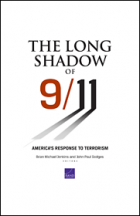The Long Shadow of 9/11: America’s Response to Terrorism
 Brian Michael Jenkins and John Godges, eds., RAND Corporation (MG-1107), 2011
Brian Michael Jenkins and John Godges, eds., RAND Corporation (MG-1107), 2011
This book provides a multifaceted array of answers to the question, In the ten years since the 9/11 terrorist attacks, how has America responded? In a series of essays, RAND authors lend a farsighted perspective to the national dialogue on 9/11’s legacy. The essays assess the military, political, fiscal, social, cultural, psychological, and even moral implications of U.S. policymaking since 9/11. Part One of the book addresses the lessons learned from America’s accomplishments and mistakes in its responses to the 9/11 attacks and the ongoing terrorist threat. Part Two explores reactions to the extreme ideologies of the terrorists and to the fears they have generated. Part Three presents the dilemmas of asymmetrical warfare and suggests ways to resolve them. Part Four cautions against sacrificing a long-term strategy by imposing short-term solutions, particularly with respect to air passenger security and counterterrorism intelligence. Finally, Part Five looks at the effects of the terrorist attacks on the U.S. public health system, at the potential role of compensation policy for losses incurred by terrorism, and at the possible long-term effects of terrorism and counterterrorism on American values, laws, and society.